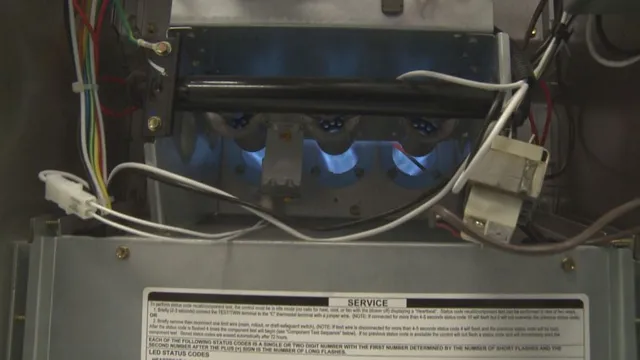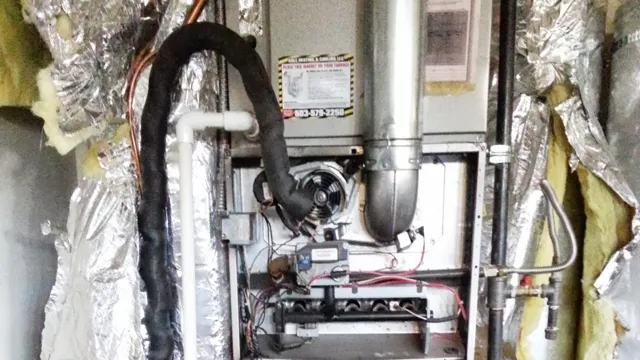Have you ever wondered if your furnace can catch fire? It’s a valid concern, especially as colder weather approaches and you’re relying on your furnace to keep your home warm and cozy. The good news is that most furnaces are safe and won’t pose a fire hazard if properly maintained and used correctly. However, there are certain situations where a furnace can catch fire, and it’s important to be aware of them in order to prevent a potentially dangerous situation.
In this blog post, we’ll explore the causes of furnace fires and provide tips on how to keep your furnace functioning safely all winter long.
How Furnaces Work
If you’re wondering whether a furnace can catch on fire, the answer is yes. Furnaces can pose a fire hazard if they’re not installed and maintained properly. A furnace works by heating air and distributing it throughout your home, using a fuel source such as natural gas, propane, or oil.
However, if the fuel is not burned properly due to a lack of oxygen or a faulty heating element, it can cause a fire. Additionally, flammable materials such as paper, clothing, or furniture should never be stored close to the furnace. To prevent a fire, it’s important to schedule regular maintenance checks for your furnace to ensure it’s functioning properly and to keep combustibles away from it.
If you ever notice a strange smell or see smoke coming from your furnace, turn it off immediately and call a professional to assess the situation. By being cautious and proactive, you can ensure the safety of your home and family when using a furnace.
Combustion Process
Furnaces are essential to keep our buildings warm during cold and harsh winters. But have you ever wondered how do they work? Furnaces burn fuel to produce heat for our homes or commercial buildings. The combustion process involves the conversion of fuel into heat energy through chemical reactions.
The furnace’s burners ignite the fuel, which mixes with air, and the combustion process generates hot gases. These gases are then passed through a heat exchanger, transferring the heat energy to the surrounding air. The warm air is then circulated throughout the building, keeping it cozy during the winter months.
Natural gas is the most common fuel used in furnaces as it is abundant, efficient, and affordable. However, some homes use propane, oil, or electricity as fuel sources. Each fuel source has different combustion processes and equipment.
For instance, electric furnaces use heating elements to convert electricity to heat, while oil furnaces require an ignition source to ignite the fuel. In summary, furnaces use combustion processes to produce heat that keeps our buildings warm and comfortable. Understanding the combustion process is essential to ensure the furnace works efficiently and safely.
If you suspect any issues with your furnace, it is best to contact a professional technician to diagnose the problem and prevent any hazardous situations.

Heat Exchange System
Furnaces work by utilizing a heat exchange system. This system involves the combustion of fuel, which heats up the heat exchanger. The heat exchanger then transfers the heat to the air, which is blown over the exchanger by a fan.
The heated air is then distributed throughout the house via ductwork. The combustion process typically involves natural gas or propane, and the heat exchanger can be made from a variety of materials such as stainless steel or cast iron. It’s important to ensure that your furnace is properly maintained and serviced, as a faulty system can lead to a potential safety hazard.
Regular maintenance can also help improve the efficiency of your furnace and save you money on your energy bills. So, make sure to schedule routine inspections to keep your furnace functioning at its best!
Causes of Furnace Fires
Can a furnace catch on fire? Yes, it can. Furnaces may face various problems throughout their lifetime, and some of them can cause fires. One of the leading causes of furnace fires is lack of proper maintenance.
Furnaces that are not regularly cleaned, inspected, and serviced can accumulate dirt, debris, and flammable materials, which can ignite and cause a fire. Another cause is a faulty electrical system, especially if the wiring is old or damaged. It can overheat and ignite nearby flammable materials or generate sparks that can set things on fire.
Furnaces can also catch on fire due to malfunctioning parts, such as the thermostat, control board, or heating elements. In addition, if the furnace is overloaded or if flammable materials are stored near the furnace, it can increase the risk of a fire. Therefore, it’s crucial to have a professional inspect and maintain your furnace regularly to reduce the risk of a fire hazard.
Poor Maintenance
If you neglect the maintenance of your furnace, there’s a high likelihood of causing a fire. Poor maintenance is one of the leading causes of furnace fires, and it’s usually avoidable. When the furnace isn’t inspected regularly, it might be working hard, accumulating dirt and debris that can ignite if not removed.
A neglected furnace might also have loose or faulty electrical connections, which can cause sparks that can lead to a fire. In addition, a dirty furnace filter or clogged ductwork can cause the furnace to overheat, and if not detected early, it can lead to extensive damage and in some cases, fatalities. It’s essential to have a professional inspect your furnace annually to ensure it’s in excellent working condition to prevent furnace fires caused by poor maintenance.
Don’t take your furnace for granted, have it checked and ensure it’s safe to use all year round.
Ignition Sources
Furnace fires can have devastating consequences, both in terms of property damage and personal injury. But what can cause a furnace to catch fire? There are a few potential ignition sources to be aware of. One common culprit is faulty electrical wiring or connections, which can cause sparks.
Another is a malfunctioning burner, which could ignite flammable materials within the furnace. In some cases, a furnace fire may be caused by improper maintenance or cleaning, such as failing to remove combustible materials or neglecting to change the air filter. It’s essential to make sure that your furnace is regularly inspected and maintained by a professional to minimize the risk of any of these causes starting a fire.
Fuel Leaks
Fuel leaks from furnaces can lead to serious safety hazards, including the risk of fires. One of the most common causes of furnace fires is related to fuel leaks. Fuel leaks often happen due to poor maintenance or faulty installation of the furnace components.
If the furnace is not inspected or serviced regularly, it may develop leaks that allow fuel to escape and ignite, creating a fire. Additionally, if the furnace is not installed properly, it may cause fuel to leak. For example, if the fuel hoses are not connected tightly to the furnace, fuel may leak out, creating a potentially hazardous situation.
It is essential to regularly check and maintain the furnace to prevent fuel leaks and to ensure safety, otherwise, it may result in a catastrophic accident. Therefore, homeowners need to take furnace safety seriously by scheduling regular maintenance and inspections. Only a professional technician can detect and resolve any fuel leaks, ensuring that the furnace operates safely and efficiently.
Preventing Furnace Fires
Yes, a furnace can catch on fire, but there are several steps homeowners can take to prevent this from happening. One of the most important things to do is to have your furnace regularly serviced and inspected by a professional technician. This ensures that any potential problems are caught and dealt with before they can escalate into a fire hazard.
Additionally, it’s important to make sure that any flammable materials are kept far away from your furnace, including anything stacked on top of or against it. Homeowners should also ensure that their furnace is installed in a safe and proper location, and that there is plenty of ventilation to allow the furnace to function properly without overheating. By taking these precautions and being vigilant, you can greatly reduce the risk of a furnace fire in your home.
Regular Maintenance
Regular furnace maintenance is essential to prevent fires in your home. Many homeowners neglect this crucial task, which can lead to catastrophic consequences. Furnaces can overheat due to a buildup of dirt and debris, causing the motor to malfunction and potentially start a fire.
Maintaining your furnace regularly by cleaning or replacing filters, checking the fan and belts, and ensuring proper ventilation can go a long way in preventing fires and keeping your family safe. It’s important to schedule annual professional maintenance to ensure that your furnace is in proper working condition. Don’t take any chances when it comes to the safety of your home and family; make regular furnace maintenance a top priority.
Proper Installation
Proper installation of a furnace is vital to avoid any mishaps down the road. One of the most significant dangers that arise due to poor installation is furnace fires. It is essential to ensure that the furnace is installed correctly, and all the necessary precautions are taken.
Installing the furnace in the correct area with enough space ensures that there are no combustible materials nearby to ignite. Regular cleaning and maintenance of the furnace help in avoiding accumulation of debris and dust, which can lead to a fire hazard. The importance of having a carbon monoxide detector installed cannot be stressed enough.
If there is a faulty installation, carbon monoxide leaks can occur, leading to severe health issues. Proper installation is key to ensuring the safety of your home and family. Don’t compromise on safety when it comes to furnace installation.
What to Do if Your Furnace Catches Fire
It is rare for a furnace to catch on fire, but it can happen if there is a defect in the unit or if it is not properly maintained. If your furnace does catch fire, the first step is to turn off the power source and call the fire department. Do not try to put out the fire yourself, especially if it has spread beyond the furnace.
It is important to have your furnace serviced regularly by a qualified technician to prevent potential fire hazards. Additionally, make sure that there is nothing flammable stored near the unit and that there is adequate ventilation around it. Taking these precautions can help reduce the risk of a furnace fire in your home.
Conclusion
In conclusion, while it is possible for a furnace to catch on fire, it’s highly unlikely if it’s maintained and monitored properly. Just like any machine, furnaces require regular upkeep to ensure they’re running efficiently and safely. So, to answer the question, yes, a furnace can catch on fire, but with a little TLC, you can prevent any fiery mishaps and keep your home toasty warm without any worry.
“
FAQs
What are the common causes of a furnace catching fire?
The common causes of a furnace catching fire are malfunctioning parts, buildup of dust and debris, and improper installation and maintenance.
Can a furnace catch fire if it’s not serviced regularly?
Yes, a furnace can catch fire if it’s not serviced regularly. Regular maintenance and cleaning help prevent any potential fire hazards.
What steps can I take to prevent a furnace fire?
You can prevent a furnace fire by scheduling regular maintenance, cleaning or replacing air filters, keeping the area surrounding the furnace clear of debris, and ensuring proper ventilation.
What should I do if my furnace catches fire?
If your furnace catches fire, immediately turn off the furnace and evacuate the area. Call the fire department and do not attempt to extinguish the fire on your own.

